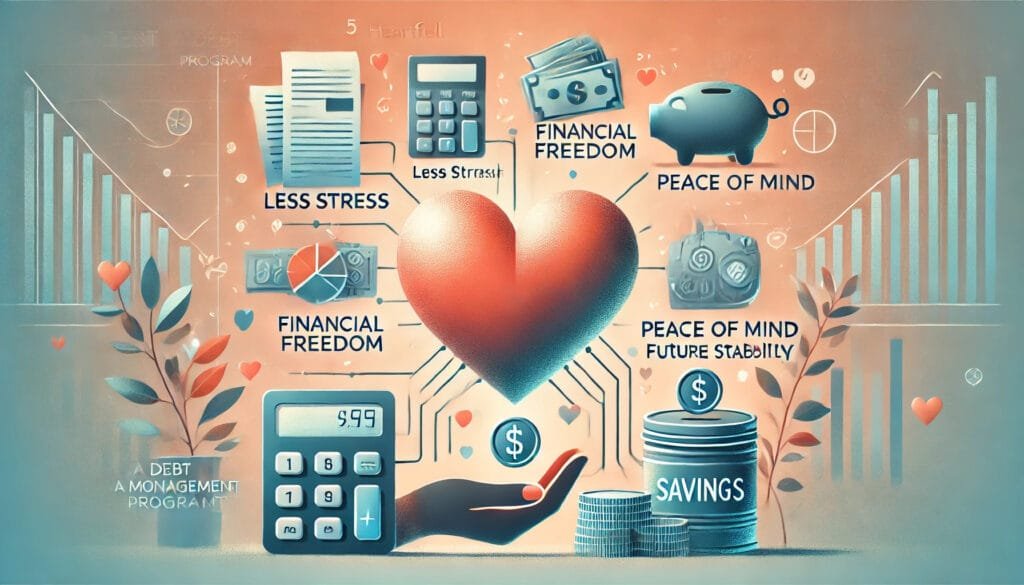
Table of Contents
Debt Management Program: A Path to Financial Freedom
Debt is a part of life for many people, yet it carries a weight that can feel overwhelming, stressful, and sometimes inescapable. The pressure of monthly payments, the growing interest rates, and the constant worry of how to make ends meet can drain anyone emotionally and mentally. However, hope exists for those who seek it—a Debt Management Program (DMP). It’s more than just a financial tool; it’s a structured lifeline that offers a path to financial freedom.
In this article, we will explore what a Debt Management Program is, how it works, its benefits, and the emotional relief it can provide. Along the way, we’ll humanize this technical financial solution, connecting it to real-life experiences, feelings, and the journey to regain control over one’s life.
What is a Debt Management Program?
At its core, a Debt Management Program is a service offered by credit counseling agencies that aims to help individuals consolidate their debts into manageable monthly payments. It’s designed to offer relief for those struggling with unsecured debts, such as credit card balances, medical bills, and personal loans. Unlike bankruptcy, which can have long-term effects on your credit score, a DMP helps you pay off your debts over time while maintaining your dignity and rebuilding your credit.
But this isn’t just about numbers and interest rates. A DMP is about restoring peace of mind. It’s about giving people a chance to breathe again, to sleep without worrying about how to make the next payment, and to reclaim the confidence they may have lost along the way.
TO LEARN FROM ABOUT THE TOPIC FOR UK CANDIDATE
The Emotional Toll of Debt
To understand the true impact of a Debt Management Program, we must first acknowledge the emotional toll that debt takes on an individual. Debt isn’t just a financial burden; it seeps into all aspects of life—relationships, mental health, self-worth. The overwhelming pressure of accumulating debts can lead to anxiety, depression, and feelings of shame.

Imagine the crushing weight of juggling multiple creditors, each with their own payment deadlines and interest rates. Many people feel isolated in their struggle, as if they’ve failed at managing their finances. This emotional strain often leads to sleepless nights, strained relationships, and a constant fear of the unknown.
It’s in this space—where financial stress meets emotional exhaustion—that a Debt Management Program can make a profound difference.
How a Debt Management Program Works
When someone enrolls in a Debt Management Program, they’re essentially taking the first step toward financial recovery. The process typically involves the following steps:
1. Assessment of Debts and Financial Situation
A credit counselor works with the individual to evaluate their total debts, income, and expenses. This step is crucial, as it provides a comprehensive understanding of the person’s financial health. It can feel intimidating to lay out all the numbers, but it’s the first step in reclaiming control.
2. Creating a Personalized Debt Repayment Plan
Based on the assessment, the counselor creates a repayment plan that consolidates all debts into one manageable monthly payment. This single payment is often lower than the combined payments the person was making before, as the agency may be able to negotiate lower interest rates or waive fees with creditors.
3. Negotiating with Creditors
One of the key benefits of a DMP is that credit counselors often have established relationships with creditors. They can negotiate better terms, which can reduce the overall debt burden. This step alone can offer significant emotional relief—knowing that someone is advocating on your behalf.
4. Consistent Payments and Monitoring
Once the plan is in place, the individual makes a single payment to the credit counseling agency, which distributes the funds to creditors. Throughout the program, the agency monitors progress and may adjust the plan if necessary.
This structured approach offers more than just a financial solution—it brings peace of mind. The once overwhelming tangle of debts is replaced with a clear, manageable plan.
The Psychological Impact of Regaining Control
Debt can make people feel helpless, as if they’re in a never-ending cycle of payments, interest, and penalties. When they enter a Debt Management Program, they’re not just taking control of their finances—they’re taking control of their life.
For many, this sense of control is empowering. It’s the difference between waking up dreading the day and waking up with a sense of hope. Knowing that there’s a plan in place, knowing that the burden is no longer growing uncontrollably, can bring immense relief. It’s like finally seeing a light at the end of the tunnel after years of darkness.
Additionally, DMP participants often experience improved relationships. Financial stress is one of the leading causes of tension between partners, friends, and family members. As the pressure eases, so too does the strain on these relationships, allowing for more open communication and support.
The Benefits of a Debt Management Program
Beyond the emotional and psychological relief, a DMP offers several tangible benefits:
- 1. Reduced Interest Rates: Credit counselors can often negotiate with creditors to lower interest rates, which can significantly reduce the amount paid over time. Lower interest rates mean more of the monthly payment goes toward paying off the principal, rather than just covering interest.
- 2. Waived Late Fees: Many creditors are willing to waive late fees and other penalties once a Debt Management Program is in place. This can reduce the total debt owed and provide immediate relief.
- 3. Debt Consolidation Without New Loans: Unlike other forms of debt consolidation, a DMP doesn’t require taking out a new loan. This reduces the risk of falling into deeper debt and keeps the process focused on repayment.
- 4. Improved Credit Over Time: While enrolling in a DMP may initially lower your credit score, consistently making on-time payments can improve your credit over time. As debts are paid off, your credit utilization ratio decreases, and your overall financial health improves.
- 5. Single Monthly Payment: One of the most significant stressors of debt is juggling multiple payments each month. With a DMP, you make one consolidated payment, simplifying the process and reducing the risk of missed payments.
Essential Tools for a Debt Management Program

- 1. Budgeting Apps
Apps like Mint, YNAB (You Need A Budget), and EveryDollar help you track income, expenses, and savings goals. They make budgeting simple and allow you to allocate funds towards debt repayment efficiently. - 2. Debt Repayment Calculators
Online tools like Bankrate’s Debt Payoff Calculator or Undebt.it allow you to input your debt, interest rates, and monthly payments to plan how long it will take to become debt-free. These calculators help visualize your progress. - 3. Credit Counseling Services
Agencies like NFCC (National Foundation for Credit Counseling) or GreenPath Financial Wellness provide credit counseling services, helping you assess your financial situation, negotiate with creditors, and set up a Debt Management Program. - 4. Debt Consolidation Loans
Tools from financial institutions that offer debt consolidation loans can combine multiple debts into one payment, often at a lower interest rate. Platforms like LendingClub and SoFi offer these services. - 5. Spreadsheets
Simple Excel or Google Sheets templates can be customized to track your debt payments, interest rates, and timelines. Spreadsheets are effective for those who prefer manual tracking and flexibility. - 6. Automated Payment Systems
Setting up automatic payments through your bank or credit card provider ensures timely payments, helping you avoid late fees and additional interest charges. - 7. Financial Education Resources
Websites like MyMoney.gov or Consumer Financial Protection Bureau (CFPB) offer educational tools and guides on managing debts, budgeting, and long-term financial planning. - 8. Credit Monitoring Tools
Services like Credit Karma or Experian allow you to monitor your credit score and report. These tools are crucial for tracking how your debt management efforts are improving your credit health. - 9. Debt Snowball and Avalanche Tools
Tools like Tally or the Debt Snowball Calculator help you strategize the most effective ways to pay off debt, whether by focusing on the smallest balances first (snowball method) or the highest interest rates (avalanche method). - 10. Support Networks and Forums
Online communities such as Reddit’s r/personalfinance or Bogleheads offer emotional support and practical advice from others going through similar debt management journeys.
Personal Stories of Hope and Recovery

Debt Management Programs have helped countless individuals regain their financial footing. One story that stands out is that of Sarah, a single mother who found herself drowning in credit card debt after a series of medical emergencies.
For years, she struggled to keep up with her minimum payments while caring for her two children. Each month, the interest on her debts grew, and despite her best efforts, she felt like she was falling further behind.
“I was at my breaking point,” Sarah recalls. “I didn’t know how I was going to keep going. I was working so hard, but it never seemed like enough.”
That’s when she learned about a Debt Management Program. With the help of a credit counselor, Sarah was able to consolidate her debts into one manageable payment. The relief was immediate.
“I finally felt like I could breathe again,” she says. “I wasn’t constantly worried about which bill I was going to pay next. For the first time in years, I felt like I had control.”
Sarah’s story is not unique. Across the country, thousands of people have found hope and a way out of their financial struggles through Debt Management Programs.
Addressing Common Fears and Misconceptions
Despite the benefits of a DMP, many people hesitate to enroll due to fear or misconceptions. Some worry that entering a program will damage their credit, while others fear that seeking help is an admission of failure.
But seeking help is not a sign of failure—it’s a sign of strength. It takes courage to acknowledge that you need assistance, and it takes even more courage to take the steps to fix the problem. Debt is not a reflection of someone’s character; it’s a financial situation that can happen to anyone. What matters is how one chooses to address it.
Emotional and Practical Tips for Managing Debt
While a Debt Management Program offers structured assistance, here are some emotional and practical tips to complement the process:
- 1. Acknowledge Your Feelings: It’s okay to feel anxious, frustrated, or even embarrassed about debt. Acknowledge those emotions, but don’t let them define you. Recognizing how you feel is the first step toward healing.
- 2. Seek Support: Whether from family, friends, or financial counselors, support can make a significant difference. Surround yourself with people who understand your situation and encourage you to keep moving forward.
- 3. Celebrate Small Wins: Paying off debt can feel like a long road, but every payment is progress. Celebrate the small wins—each month you make a payment, you’re closer to financial freedom.
- 4. Focus on What You Can Control: While you can’t change the past, you can take steps toward a better future. Focus on the things you can control, such as budgeting, cutting unnecessary expenses, and sticking to your debt repayment plan.
- 5. Stay Motivated: Visualize what your life will look like once you’re debt-free. Whether it’s owning your home outright, starting a business, or simply having peace of mind, keep that vision front and center.
Conclusion: The Journey to Financial Freedom
A Debt Management Program is more than just a tool for financial recovery—it’s a lifeline for those who feel overwhelmed by debt. It offers structure, support, and, most importantly, hope. For anyone struggling under the weight of debt, enrolling in a DMP can be the first step toward a brighter, more secure future.
Debt is not a life sentence. With the right plan, the right support, and a commitment to change, financial freedom is within reach.
FAQ: Debt Management Program
1. What is a Debt Management Program (DMP)?
A Debt Management Program (DMP) is a service provided by credit counseling agencies that helps individuals consolidate and manage their unsecured debts, such as credit card balances, medical bills, and personal loans. It offers a structured repayment plan with reduced interest rates and fees, enabling individuals to pay off their debts over time while avoiding bankruptcy.
2. How does a Debt Management Program work?
A DMP works by consolidating your debts into one manageable monthly payment. A credit counselor will work with you to assess your total debts and financial situation, create a personalized repayment plan, and negotiate with creditors to lower interest rates or waive fees. You make a single monthly payment to the credit counseling agency, which then distributes the funds to your creditors.
3. What types of debt can be included in a Debt Management Program?
A Debt Management Program typically covers unsecured debts, including:
Credit card balances
Personal loans
Medical bills
Store credit card debt
Some student loans (depending on the lender)
Secured debts, like mortgages and car loans, are not typically included in a DMP.
4. Will enrolling in a DMP hurt my credit score?
Initially, enrolling in a DMP may cause a slight dip in your credit score because creditors might close or reduce your accounts. However, as you make consistent on-time payments and reduce your debt, your credit score can improve over time. A DMP helps you avoid defaults and bankruptcy, which can have a much more severe long-term impact on your credit score.
5. Can I still use my credit cards while on a DMP?
Most creditors will require you to close or stop using your credit cards while enrolled in a Debt Management Program. This is to ensure that you focus on paying off existing debts rather than accumulating new ones. Some agencies may allow you to keep one card for emergencies, but it depends on the specific program and agreements with creditors.
6. How long does a Debt Management Program last?
A typical Debt Management Program lasts between 3 to 5 years, depending on the amount of debt and the monthly payments you can afford. Your credit counselor will work with you to create a repayment schedule that ensures you pay off your debts within this timeframe.
7. What are the benefits of enrolling in a Debt Management Program?
The main benefits of a DMP include:
Reduced interest rates: Creditors often agree to lower interest rates, helping you pay off your debt faster.
Waived fees: Late fees and penalties may be waived by creditors once you’re enrolled in a DMP.
Single monthly payment: Instead of juggling multiple payments, you make one consolidated payment to the agency.
Debt payoff plan: A clear path to becoming debt-free with support from financial professionals.
Improved credit: As debts are paid off, your credit score can improve over time.
8. How much does a Debt Management Program cost?
Credit counseling agencies typically charge a small setup fee and a monthly maintenance fee for managing your DMP. The fees vary by agency and location, but they are usually modest compared to the amount saved through interest rate reductions and waived fees. Non-profit agencies often offer lower fees.
9. What happens if I miss a payment on a Debt Management Program?
Missing a payment on your DMP can jeopardize the terms that your credit counseling agency negotiated with your creditors. Creditors may revert to the original interest rates and fees, which can make it harder to pay off your debt. It’s crucial to stay in communication with your agency if you foresee difficulties in making payments so they can help you adjust your plan.
10. Can I negotiate my debts myself instead of using a Debt Management Program?
While it’s possible to negotiate debts directly with your creditors, it can be challenging and time-consuming. Credit counseling agencies have established relationships with creditors and can often secure better terms than individuals can on their own. Additionally, a DMP provides structure and support to help you stay on track with your repayment plan.
11. How do I know if I qualify for a Debt Management Program?
To qualify for a DMP, you typically need to have enough income to make the monthly payments after covering your essential living expenses. Your credit counselor will assess your financial situation to determine if a DMP is the right solution for you. Individuals struggling with unsecured debt who need help organizing their payments are often good candidates.
12. What is the difference between a Debt Management Program and debt settlement?
A Debt Management Program helps you pay off your debts in full, often with lower interest rates and fees, while preserving your credit score. Debt settlement, on the other hand, involves negotiating with creditors to pay less than the total amount owed. Debt settlement can significantly damage your credit score and may result in legal action from creditors if they reject the settlement offer.
13. What happens when I complete the Debt Management Program?
Once you complete your DMP, you’ll have successfully paid off all enrolled debts. Your credit counselor may offer additional financial advice to help you stay on track and avoid future debt problems. At this point, your credit score may have improved, and you can start rebuilding your financial health with better habits and more knowledge.
14. Can I leave a Debt Management Program early?
Yes, you can leave a DMP at any time, but doing so may have consequences. Creditors may revert to the original terms of your debts, including higher interest rates and fees, which could make it harder to manage your payments. If you’re considering leaving the program early, it’s essential to speak with your credit counselor first to explore your options.
15. Is a Debt Management Program the same as bankruptcy?
No, a Debt Management Program is not the same as bankruptcy. Bankruptcy is a legal process that can discharge some of your debts but comes with long-term negative effects on your credit and financial future. A DMP, on the other hand, helps you repay your debts over time, often with reduced interest rates and fees, while avoiding the severe consequences of bankruptcy.
16. How do I choose a reputable credit counseling agency for a DMP?
Look for agencies that are accredited by the National Foundation for Credit Counseling (NFCC) or the Financial Counseling Association of America (FCAA). Non-profit agencies are often more affordable and transparent. Check reviews, ask for recommendations, and ensure the agency is clear about its fees, services, and how the program works before committing.

